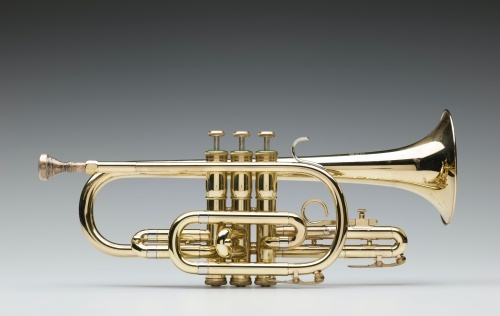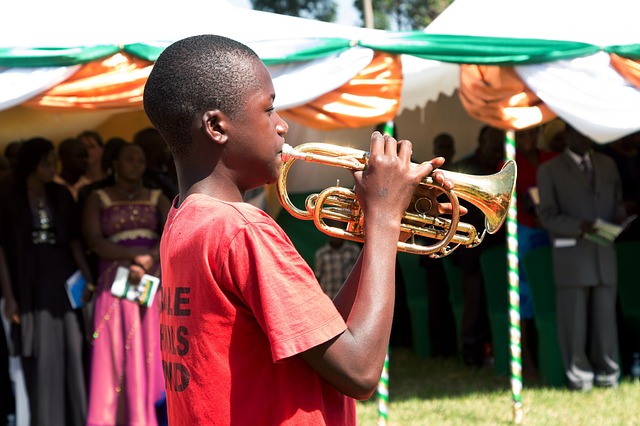At the 2020 Super Bowl halftime show, there was one song where dancers held trumpets and trombones. They weren’t playing, but the distinctive big band trumpet sound was clearly heard coming from the band. This probably wasn’t the reason, but your child has decided they want to play the Trumpet. Great. But when you show up at school, the band teacher puts a Cornet in their hands. What gives? Why?

Band Teacher: “Great. Here’s a Cornet.”
You: “What?”
Table of Contents
- What’s the difference between a cornet and trumpet?
- Is Cornet easier than Trumpet?
- What key does a Cornet play in?
- Can trumpet players play cornet?
- Rent a Cornet? Rent a Trumpet?
- Playing Trumpet With Braces?
- Does my child need private lessons?
- Cornet vs Trumpet
What’s the difference between a cornet and trumpet?
The reason most children start with the Cornet is that it’s easier. The Cornet and Trumpet are like brothers in the brass family. The Cornet and Trumpet, if stretched out from the tip of the bell to where the mouthpiece goes in (receiver), are the same length. They have a slightly different sound. The Cornet has a softer, warmer tone than a Trumpet because of the shape of the bell and the conical bore tubing shape throughout the Cornet. They weigh about the same too. So how is the Cornet easier?

Is Cornet easier than Trumpet?

First, the Cornet’s conical tubing starts off small and slowly gets bigger until you get to the bell. A modern trumpet’s cylindrical bore tubing is the same size until you get to the bell. This makes sound production on the cornet easier because it takes less physical effort to play.
Second, while a Cornet and a Trumpet weigh about the same, the shorter, more compact Cornet is easier to hold. Your child’s hands will be closer to their body so it takes less strength to hold than a Trumpet. This is why most band programs start elementary school age children on the Cornet versus the Trumpet. In middle school or the start of high school, most progress to the Trumpet. Their playing ability and physical strength will have improved greatly since elementary school so it’s a natural progression.
What key does a Cornet play in?
B-flat, same as the Trumpet and Flugelhorn. That means if you press the B flat key on a piano (which is in the key of concert C), that is the same tone or note that is a C on the Cornet, Trumpet, or Flugelhorn. This will make the transition to the Trumpet easier. What does a Cornet sound like? Glad you asked.
Here’s Musician 1st Class John Armstrong playing a cornet with the United States Navy Concert Band. He’s playing the classic Arban “The Carnival of Venice”. This is a piece that every cornet and trumpet player has or will play. Just because it’s one of the songs that we are expected to master. That’s what my band teacher said so i guess it’s true.
Back to Musician 1st Class John Armstrong. Check out his single finger playing at timecode 7:30. And he played the whole piece from memory. Just amazing.
Can trumpet players play cornet?
When the time comes, is it hard to go back and forth? The answer is they are pretty interchangeable brass instruments. The reason is that a cornet mouthpiece and a trumpet mouthpiece while different lengths, the part that matters most are the same if purchased from the same maker. Those are the cup and rim shape. While the bore and throat (the holes and inner tubing dimensions) may differ slightly, the parts that your lips come in contact will feel the same.
When I sold my 1st horn that I bought, I found the transition to a trumpet fairly easy. The fingering was exactly the same (which valve to press to change notes) as was the music reading, etc. I had purchased a Yamaha cornet and loved it. But 2 years later when I got to high school, nobody had a cornet. All the kids in the concert band had trumpets. But beyond that, I noticed I had a different sound than they did. That was a real problem. I looked for a brass musical instrument store but the local store didn’t carry anything but beginner trumpets. I wanted to advance my playing so I invested in a professional trumpet. In fact, I still have and play that horn today.
Rent a Cornet? Rent a Trumpet?

Rent verses buy? The age-old question. Since you or your child is just getting started, or coming back to playing, what makes sense? If their school or program has an brass instrument they can use, great. If you aren’t in school, you don’t have that option (and no pesky tests and PE either). The only equipment you need to invest in is a cornet mouthpiece which costs roughly $50. If you and/or your child aren’t sure if you/they will like the Cornet/Trumpet, it’s best to rent for the first few months. The costs of course will vary based on your area. Average costs for a Cornet are roughly between $15 to $40 per month for the instrument. This adds up to $180 to $480 per year. Then you have to include the required Loss Damage Waiver (LDW) insurance which covers you should something bad happen. This can range from $5 to $10 per month. So the range to rent a Cornet for a year can be anywhere from $240 to $600 or more.
Going for the lowest rental Cornet is always tempting. Inspecting the brass instrument carefully is key. The quality, playability, and how it’s been maintained before signing a contract cannot be recommended more strongly. Then, go home and do the math. For one semester or 4 month period, what is your total cost? What about a year? Armed with that information, compare that to what a good beginner Cornet costs. It may make sense to purchase an instrument. If you or your child decide it’s not for something to continue on with, you can sell it to recoup a good chunk of your investment. Your child’s school will be a great place to sell it as the new children will be going through what you are.
Playing Trumpet With Braces?
Getting braces used to be the beginning of the end for many aspiring Cornet/Trumpet players. The age that most children get them happens around the time they have developed some talent for the instrument. Some are able to continue to play with metal braces using wax and other covers that let them continue to develop. The reason for this is the cornet mouthpiece will press the lips against the braces when they play.
I personally avoided getting metal braces as a kid because of my trumpet playing. Getting them as a adult was no picnic so maybe getting them in school would have been a better idea. Instead of metal braces, the better solution to consider is to have your orthodontist use the removable plastic aligners like Invisalign braces or Smile Direct Club. These can be removed while playing and won’t interfere with practice or performing. Many children report it improved their playing because their teeth are straighter and make for a better embouchure. The cost difference between traditional metal braces and these plastic removable types have mostly gone away. The benefits for your child are the improved self-image by not having metal braces, improved self-confidence as their smile improves, and they can keep playing their instrument.
The downside of plastic removable braces are well, they are removable. I remember my friends in school that would wrap their metal and plastic retainers in a napkin for lunch. Then they would throw it in the trash along with their lunch tray. So the concern is, will your child remember not to throw the plastic braces away or not use it enough for it to do its job. Definitely worth having an agreement with your child on the responsibilities if you go this route.
Does my child need private lessons?
The band teacher will teach my child, right? Well, to some degree, yes. The band teacher is responsible for all the children in band class. That means individual instruction will be done by them or their helpers for very brief moments. They may be cornet/trumpet players, maybe not. Remember, there is a class full of children wanting to learn the flute, clarinet, trombone, drums, saxophone, French horn, and yes, the cornet. Like any lifelong endeavor, getting off on the right foot makes sense. The benefits of private lessons from the beginning are:
- You’ll learn how committed your child is, fast. The instructor will give your child exercises to practice. They will be expected to improve from lesson to lesson. If they aren’t committed, if they are practicing every day, that will come up quick. My 1st teacher really got on me when I didn’t master the exercises he wanted me to learn. He cancelled the lesson, called my parents and told them I wasn’t welcome back unless I “got serious”. I learned much later in life that he was hard on my because he thought I was coasting on my natural abilities and was wasting them.
- Your child will get better faster than their classmates. If they do what their instructor tells them, they will learn the proper fundamentals. Beyond that, they will develop far faster as they will be pushed to practice things that are at first, difficult. They will build upon them and continue to improve.
- After the first year, it becomes very clear who has taken lessons, practiced, and is enjoying their cornet. They will be the ones that sit in the first chair of the cornet section. They will get to play the fun parts of the music. Trust me, the 2nd and 3rd trumpet/cornet parts aren’t that much fun to play. The 1st chair gets to play solos and play the melodies more. More importantly, they will most likely be the leaders of the cornet section. They will learn some amazing life lessons by being the leader of their trumpet band section.
- The best thing is that you can find amazing trumpet teachers across the country or the world for that matter. With video conference calling pretty much everywhere for free, you can find a great teacher and take lessons in the comfort of your own home.
Cornet vs Trumpet
Hopefully now you understand why your child was handed a cornet instead of trumpet when they first started. As a comeback player, I started back on a flugelhorn as it was a bit easier to start up again given the conical bore like a Cornet. Now I’m no Louis Armstrong (one of the worlds greatest trumpet players), not even close. But playing my trumpet and flugelhorn gives me joy, makes me concentrate on learning something, and trying to get better every time I pick my horn up. I guess that’s one of the most wonderful gifts about the learning a musical instrument, is the gift of life time learning.
Hope this helps.
As always, thanks for playing along !

